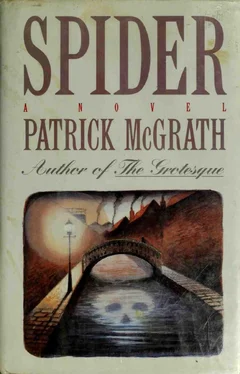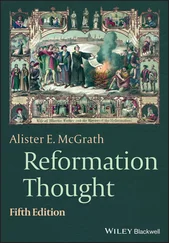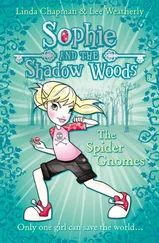Still I knelt there by the door, gazing at the woman; I dared not move. From behind her in the bed my father murmured something and I saw her shake her head. Absently she scratched her ear, and this set her breasts wobbling. Her belly swelled like a soft white cushion; I was fascinated with the triangle of soft flesh beneath its crease, and the little tuft of curly black hair between her thick thighs. Again she yawned, and turned toward my father, and I drew back from the door. A moment later I heard her cross the floor to the wardrobe, I heard the hangers jangle as she pawed through my mother’s clothes; and on soundless feet I slipped back to my own room.
Later she wanted to look over the house. I watched her pick her way carefully down our narrow stairs, descending in a sort of cautious sideways movement in a tight-belted dark blue dress with small white spots: my mother’s Sunday dress. I watched her go down, her bottom bulging and a plump hand on the banister, and as I listened to the clack of her heels I couldn’t help remembering the soft slushy shuffling sound my mother’s slippers made when she moved around the house. She had painted her mouth with my mother’s lipstick and fixed her hair with my mother’s comb; the scent, however, was all Hilda. Her belly was prominent in the thin material of the spotted blue dress, it was a generous, fleshy belly that sloped away at the flanks to the firm, trunklike roundness of her upper thighs, between which the material clung like a veil or curtain concealing a shadowy concavity. “Two-up two-down, is it?” she said as my father descended the stairs after her (she’d already stuck her nose into my room, but she hadn’t seen me, I was under the bed), then, without waiting for his answer: “I like a little house like this, Horace, I’ve always wanted one of these, Nora can tell you that.”
Then—and note how casually she tossed this out—“You own it, eh?”
You own it, eh: this is significant, we shall return to this later. Suffice for now that Hilda Wilkinson, a common prostitute, had spent her whole life drifting from lodging to lodging, often at the dead of night; a man who owned his own home was an attractive proposition—how much more attractive, should that man’s wife have disappeared! On she went, her awful boisterous voice ringing through the house, her motives plain as day: “Put your money in real property, that’s what I always say. This the parlor, is it, Horace? Now this is a nice room, you could entertain your friends in here.”
Horace and Hilda spent an hour in the parlor and drank the rest of the whisky. From what I could hear she was comfortable in there, it seemed to appeal to some submerged yearning she had for gentility. She filled it to overflowing with her presence as she admired the modest fireplace with its polished brass scuttle, its poker and irons, and she expressed pleasure as well in the tiled mantelpiece, the oval mirror above it, and the five china geese hanging on a diagonal across the wall. She also liked the pattern of the wallpaper and the chintz cushion covers. The glass-fronted cabinet with its three pieces of Wedgwood: this pleased her too. “I do like a parlor, Horace,” she said, more than once, “gives a place respectability.” What did my father make of this, staving off, as he was, with whisky, an utter maelstrom of guilt when with every passing hour the murder like a virus gnawed deeper into the tissue of his vital organs?
There was bacon in the house, and after finishing the whisky they moved to the kitchen. They ate their breakfast as night fell; I smelled the bacon from upstairs, and it sharpened the edge of my own ravenous hunger, for I had eaten nothing all day; but I would not go down. I sat at the window and gazed at the glow from the kitchen, which barely penetrated the darkness in the yard. I saw Hilda go through the back door to the outhouse, and I was tempted then to go downstairs but the prospect of encountering her when she came back in deterred me. “You should fix that toilet of yours, Horace,” she said on her return. “Fine state of affairs when a plumber’s own toilet don’t work!”
Ten minutes later they left for the Earl of Rochester, and I came downstairs. There was no bacon left, so I had to make do with bread and dripping.
Would that awful day never end? I could think no more about it, that long evening I spent alone in the house with the smell of Hilda everywhere in my nostrils. I went out into the fog after my bread and dripping, and made for the canal, where I wandered along in a morose state, at times desperate, at times tearfully furious, kicking stones into the black water and taking what small comfort I could from the foggy darkness of the night. Where was my mother? Where was she? I returned to number twenty-seven after nine and came in through the back door; the house was empty. I ate more bread and dripping then went up to my room and got out my insect collection again. I heard my father come in late, alone; he sat up in the kitchen drinking beer until he passed out. I crept down around midnight and saw him slumped in a chair by the stove, still in his cap and scarf, and a cigarette adhering to his lower lip even as he slept.
The next day was Sunday. As was his habit he went to his allotment. The fog had dissipated somewhat, it was a cool, cloudy morning, and it looked as if it might rain later. As he cycled through the empty streets he was still very much a man in crisis: barely thirty hours had elapsed since the murder, and he had not yet adjusted to the new territory he occupied. Murder sets a man apart, moves him into a separate world, narrow and constricted, bound and constrained by guilt, complicity, and the fear of betrayal. None of this he had fully realized, for he was still to some extent in shock; he pedaled his bicycle past curtained windows behind which slept a world from which he was now exiled forever, though this, as I say, was not yet apparent to him.
That soon changed! There has always seemed to me to be a sort of bleak poetic justice in the fact that the allotment, to which my father had so often fled from his domestic life, should now be charged with the horror of my mother’s murder. He himself felt this only dimly as he pedaled through the streets that Sunday morning, but the closer he came to the railway bridge the stronger the impulse was to turn around and get as far away from the place as possible. But he did not turn round, for he was also aware of a vague, perverse stirring of excitement at the prospect of seeing again the ground beneath which she lay.
Nothing, however, prepared him for the wave that hit him when he opened the gate and stood at the end of his path. For some moments it swirled about him in a sweeping, spinning movement, as though the allotment had become an active force field in a state of intense disturbance. It warped his perceptions: the shed and the vegetables seemed to turn black in front of his eyes, and before he had taken one step down the path he sensed a sort of thrashing and writhing all about him, and then for the few interminable moments it took him to reach the shed the suddenly dark, damp air of the morning swarmed with tiny malignant germs, and to pass through these swarms required no little determination. The effect was weakened somewhat when he gained the interior of the shed and shut the door on the garden’s malevolence, but outside it did not abate for a moment, the whole of that Sunday.
(I know this feeling, I too have been tormented in this way, I too have felt them clacking and clicking round the back of my head like the teeth of a hound, like a cloud of chattering gnats, in fact the sound is rarely absent, though most of the time it is mercifully subdued, more of a hum than anything else.)
Читать дальше












